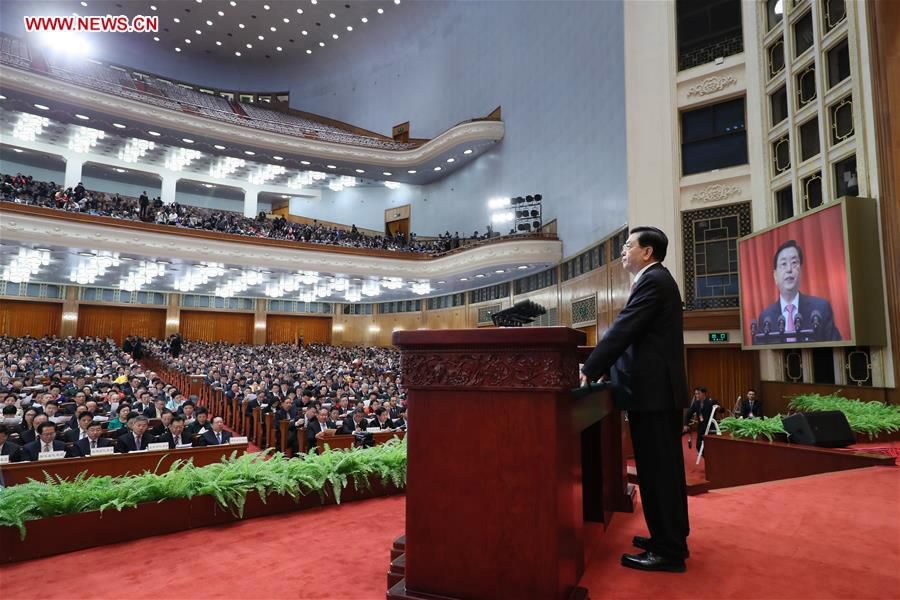
Politics
16:41, 10-Mar-2017
Views on Two Sessions: The effect of China’s new “Civil Code”
Updated
11:00, 28-Jun-2018

Guest commentary by Zhu Yiyi
Should unborn fetuses be given the same rights as adults?
At what age should children be able to think for themselves?
And what should be the rights of elderly people who cannot care for themselves?
China has just drafted some of its most important legislation, but unless you are fluent in “legal language” it might just pass you by. Here is what you need to know:

Zhang Dejiang, chairman of the Standing Committee of China's National People's Congress (NPC), delivers a work report of the NPC Standing Committee during the second plenary meeting of the fifth session of the 12th NPC at the Great Hall of the People in Beijing, on March 8, 2017. / Xinhua Photo
Zhang Dejiang, chairman of the Standing Committee of China's National People's Congress (NPC), delivers a work report of the NPC Standing Committee during the second plenary meeting of the fifth session of the 12th NPC at the Great Hall of the People in Beijing, on March 8, 2017. / Xinhua Photo
The motion to compile the “Civil Code” was passed by the Fourth Plenary Session of the 18th Central Committee. Civil law is the basic foundation for civilian life and behavior in all walks of society, and the cornerstone of a market economy. Therefore, the development of a Civil Code reflects directly on how a society operates and the constitution of a nation.
The third draft of the “General Provision of Civil Law” was forwarded to the 12th NPC Standing Committee for deliberation on December 19, 2016. According to the bulletin, the third draft includes 11 chapters, with 210 provisions in total, which cover basic principles such as: the ‘nature of a person’, ‘a legal entity’, ‘civil legal action’, ‘unincorporated association’, ‘civil rights’, and ‘civil liability’. While this can sound very technical, it can determine whether someone can bring a legal case against another person or not and what civil rights a person has in the country.
Based on China’s current situation, the legislation largely draws upon existing legal frameworks, but also makes several important innovations. Here are some key highlights:
First, Article 17 of the draft considers the right of the fetus. When it comes to inheritance rights or the right of receiving gifts, according to the article, fetuses now enjoy the same rights as other “natural persons.” Therefore, the provision renews the definition of a “natural person” by extending legal protection to unborn human beings, a strong demonstration of the consideration of human rights.
Furthermore, Article 20 and 21 of the draft lowers the age of the ‘limited capacities’ of a natural person from ten years old to six years old. In layman's terms, six-year-olds are now considered able to think for themselves, an important distinction for when a child would be called on to give testimony in court or if a child's actions and needs ever come into question. Due to the development of the economy and education, nowadays, children tend to mature earlier mentally and physically. Thus, older legislation which set the limit of the civil capacity at the age of ten can no longer meet society’s current needs.
Moreover, rather than only covering minors and people with mental illnesses, the draft includes elderly people who might not be able to take care of themselves (Article 22 and 23).China’s aging population has been one of the nation’s main concerns, so the draft comes right on time. On one hand, it shows care and concern for the rights of the elderly, which helps society by actively dealing with the problem of an aging population. On the other hand, it represents how legislation must evolve with changing social demands and echo fundamental human rights.
Finally, the legislation extends the period somebody can take legal action after an event from two years to three years. Article 191 of the draft balances the conflict between the protecting the rights of people who want to take legal actions against the rights of people protecting their property from being confiscated for something that might have happened years in the past. The aim of setting time limits for civil actions will be to urge litigants to claim their rights actively, otherwise the court would not be able to support their claims effectively once the statute of limitations has been expired. But a short period of limitation might block litigants from claiming the rights they deserve.
We are looking forward to the compiling of the “Civil Code” because the “rule of law” has always been a requirement of the people. As a piece of legislation that's under the spotlight, the “Civil Code” should fulfill the hopes of Chinese citizens, while creating a legal framework fit for a modern China.
(Dr. Zhu Yiyi is attorney of Grandall Law Firm based in Shanghai. The article reflects the author’s opinion, not necessarily the view of CGTN.)
3km

SITEMAP
Copyright © 2018 CGTN. Beijing ICP prepared NO.16065310-3
Copyright © 2018 CGTN. Beijing ICP prepared NO.16065310-3